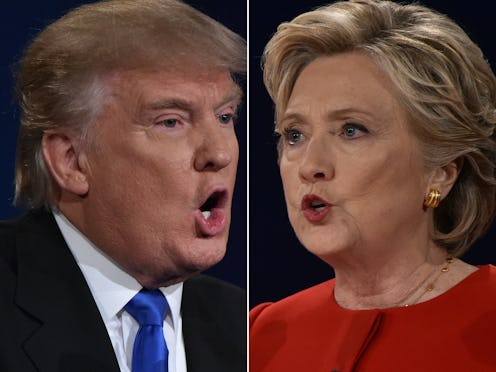News
Debating Abortions Is Never Just About Abortions
Sunday night sees the rematch of Republican Donald Trump and Democrat Hillary Clinton in the second presidential debate at Washington University in St. Louis, Missouri. Already, there’s a lot of talk about what subjects the moderators should steer the conversation toward. On Thursday, in an open letter, eight pro-choice groups implored Martha Raddatz and Anderson Cooper, the moderators of Sunday night’s upcoming debate, to address what they term “a crisis of abortion access."
The open letter — which was signed by the heads of NARAL Pro-Choice America, Emily’s List, the National Organization of Women, and the Planned Parenthood Action Fund, among others — called for allowing “the candidates to talk about their differing plans to defend and expand our constitutionally protected right to access abortion.” It underscored the idea that “abortion is not a 'niche' issue.”
Although abortion and women’s reproductive rights were not addressed at Trump and Clinton’s first debate in late September, the issues did come up in a big way during Tuesday’s vice presidential debate between Tim Kaine and Mike Pence. During a segment on personal faith, Kaine, a Catholic who is personally against abortion, made the case that despite one’s personal beliefs, “on fundamental issues of morality, we should let women make their own decisions.”
Pence countered with a pro-life standby, saying, “A society can be judged by how it deals with its most vulnerable, the aged, the infirm, the disabled, and the unborn.” (Let’s leave out the hypocrisy of Pence's record of severely cutting public health funding in Indiana — so severely, in fact, that reports allege it contributed to a HIV outbreak in Scott County, Indiana).
Of course, while abortion may be the overt topic, what’s really being litigated by the subject is much larger, on both sides of the issue.
For liberals, the abortion question is tied to larger issues of control over our own bodies, and, frankly, our own minds. In Roe v. Wade, the Supreme Court located a woman’s right to choose in her right to privacy, guaranteed by the Fourth Amendment. Although the specific right to an abortion is important, it has implications for all sorts of other privacy issues, including adjacent issues like stem cell research or further-flung medical privacy issues that affect transgender people. Considering that the next Supreme Court justice will tip the balance of the court, the president chosen in November could have a lasting effect on these issues for decades to come.
Aside from being a clarion call for conservatives, the issue of abortion symbolizes a society with runaway morals and an uncertain future to many Republicans. Granted, I have my own biases as a Democrat, but when I see many Republicans address abortion, it speaks more to their yearning for a world where women didn’t have control over their own bodies, where their main purpose in life is to be mothers (or its their "most important job" as Ivanka Trump said in a recent ad). Legalized abortion strikes at the tension between living in a democracy that allows for freedom of faith, even as many on the right think of our country as a “Christian nation.” It gets at a fundamental inability to trust your fellow citizen (including and maybe especially women), and instead, needing to dictate and control how others live their lives.
These pro-choice groups are absolutely right that this issue needs to be brought up in the national presidential debate. Moreover, the specific issues surrounding access to abortion — both geographic and financial — are critical, especially for women who are less wealthy or living in rural areas.
But if (and hopefully, when) the issue comes up on Sunday, try and listen not only to what the candidates say explicitly about abortion, but what the deeper implications of those positions are.
